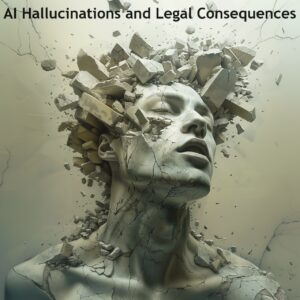
AI has recommended adding glue to bind cheese to pizza, staring at the Sun for 30 minutes and eating a rock for health once a day. AI hallucinations can be humorous, frustrating and dangerous.
𝗪𝗵𝘆 𝗔𝗜 𝗛𝗮𝗹𝗹𝘂𝗰𝗶𝗻𝗮𝘁𝗲𝘀
AI hallucinations occur when an AI system generates outputs that are not grounded in its training data or reality. This phenomenon can happen for several reasons:
Data Limitations:
If the training data is incomplete or biased, the AI might fill gaps with incorrect information.
Overgeneralization:
AI can sometimes overgeneralize from specific examples, leading to outputs that are inaccurate.
Model Complexity:
Highly complex models might produce unexpected results due to the intricate interplay of their internal parameters.
Prompt Ambiguity:
Vague or ambiguous input prompts can lead the AI to generate plausible but incorrect responses.
𝗟𝗲𝗴𝗮𝗹 𝗖𝗼𝗻𝘀𝗲𝗾𝘂𝗲𝗻𝗰𝗲𝘀
The legal implications of AI hallucinations are significant, particularly as AI systems are increasingly integrated into critical areas like healthcare, finance, and law. Here are some potential legal consequences:
Liability for Misinformation:
Companies deploying AI systems might be held liable for harm caused by inaccurate information generated by the AI.
Regulatory Compliance:
Inaccurate AI outputs can lead to non-compliance with industry regulations, resulting in fines or other penalties.
Intellectual Property Issues:
If AI-generated content infringes on copyrighted material due to hallucinations, it could lead to legal disputes and financial damages.
Consumer Protection:
Misleading AI outputs might violate consumer protection laws, leading to lawsuits and reputational damage.
To mitigate these risks, it is crucial for AI developers and deployers to implement robust validation and monitoring processes, ensure transparency in AI decision-making, and maintain accountability for AI-generated content.
Proper legal review and audit as well as proper documentation will also reduce legal exposure.
👉 What interesting AI hallucinations have you experienced?
#AI #ArtificialIntelligence #LegalTech #TechEthics #AIMisconceptions
